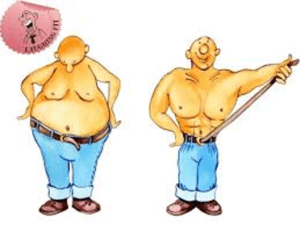Be a loser!
No, not another “how to” on weight loss?!?! Can’t we talk about diabetes, or pancreatitis or anything else???
I get it. There are about 27,000 weight loss books on Amazon, and a search of “weight loss blogs” on Google revealed almost 400,000 hits. What more could I possibly tell you???
Well, I might be able to give you a few tips on weight loss that are not very obvious, and still be helpful and (relatively) easy. Everyone knows the key to weight loss is “calories out should be more than calories in,” but what does that mean, and how do you get yourself to do it?
 If only it was this easy…
If only it was this easy…
Let’s start with exercise. There’s a common misperception that exercise has a big impact on weight loss. I usually ask patients, “Do you watch your diet?” The answer very often is, ”I exercise all the time!” Hmmm…that doesn’t answer the question. But they answer that way because we tend to equate diet with exercise, especially when it comes to weight loss.
Now don’t get me wrong; exercise is great for your heart, your lungs, your cholesterol, your mood…but it usually doesn’t have a big impact on weight. That’s because exercise tends to increase our appetite. Also, we justify eating poorly after exercise, because we did something good for ourselves, so we feel we can balance it by doing something bad.
Now some people can lose weight with just exercise, and most people can lose weight if they do a lot of exercise (e.g. 60+ minutes/day of intense exercise at least four days/week), but relying on exercise alone is typically a recipe for failure when it comes to weight loss.
So, what else is there?
Diet is the next obvious step. But most people think of “diet” as a prescribed, restrictive diet plan, such as the Atkins Diet or the Whole 30. These can result in fast weight loss, but they require drastic changes to your lifestyle, and are very hard to maintain. Most people can only sustain these diets for a few months and tend to gain all the weight back once they stop.
A better plan is to choose one or two simple changes that you can make every day, as I’ve mentioned in my previous blogs. Replace foods rather than deprive yourself. For example, try an apple instead of a danish. Have an almond butter and banana slice wrap instead of a peanut butter and jelly sandwich. Carrots and hummus are a much healthier snack than chips and dip, but often equally satisfying (or close enough???).
But even more important than what you eat is what you drink. We don’t typically count calories that we drink, but liquid calories are more quickly and more efficiently absorbed than solids.
You can drink 300 calories much faster than you can eat it. Some obesity specialists suggest that sodas, energy drinks and juice are the only reason for obesity in this country. That may be an exaggeration, but probably not by much. And this includes “diet” drinks, which have now been shown to cause weight gain, and juice, which is not nearly as healthy as Sunkist wants you to believe. And we don’t have enough room to list all the problems with energy drinks.
In fact, you should avoid ALL sweet drinks in general. Again, try to replace rather than deprive. Instead of a soda, have coffee, tea, seltzer or (gasp!) water. You can even sweeten your coffee or tea some if you’d like, because you won’t come close to matching the amount of sweetener that’s in a typical soda (which is about one teaspoon of sugar per ounce!).
Another technique to lose weight that is easy but not obvious is just to weigh yourself at least weekly. Repeated studies clearly show that the more often you weigh yourself, the more weight you lose. And this makes sense. If you put your head in the sand and ignore the issue, it’s not a problem, right? However, if you know how you’re doing, you can always improve. If your weight is up, you know you need to work a little harder. If your weight is down, you can pat yourself on the back and keep up the good work. So dust off your scale, buy a new battery, and put it somewhere obvious so you can spend 30 seconds of your week measuring your weight. And weighing yourself daily works even better.
Finally, I’ve said it before and I’ll say it again – sleep is critical for weight loss. You should get at least seven (preferably eight) hours of sleep per night. Adequate sleep helps speed your metabolism, decreases your blood sugar, keeps you from late-night snacking, and helps you think more clearly so you can make good choices. Very often I can estimate how much sleep a patient gets just by their size – it makes that much of an impact!
To recap, the not-so-obvious keys to weight loss are:
- Replace poor diet choices with 1-2 similar but healthier options each day
- Make small daily changes rather than trying drastic, fad diets
- Avoid sweet drinks (this includes “diet” drinks)
- Weigh yourself at least weekly
- Get seven or more hours of sleep per night
That’s it! See? That wasn’t so bad, right? Now today’s challenge is to try at least one of the actions above, even if you aren’t overweight. These are also great steps for overall health.
Good luck, and good health!

